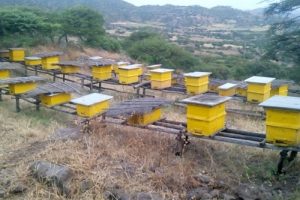
BY MENGESHA AMARE
The holistic nature of the recent reform in Ethiopia is evident when the country has considered the package of measures introduced and their mutually supportive nature. Equally, liberalizing imports and lowering import duties have been only feasible if the exchange rate was made flexible to take the brunt of any excess demand for imports.
It is also commonly stated that import substitution is an economic tool designed to complement exporting, to provide a more balanced and integrated approach to local economic development and sustainability. A society focusing on import replacement would seek to produce goods and services that are currently imported in order to keep money circulating inside. By developing local production, it would be possible to increase its capacity to meet the economic, social and cultural needs of the people of the nation from within it, Ethiopia in this context, not in a spirit of isolationism but in a spirit of independence.
As learnt from economists, import replacement is not a substitution for exports, but a way of decreasing a region or community’s vulnerability to external pressures. Homegrown industries diversify and expand the local economy and they naturally begin to look toward regional, national, and global markets as they expand and grow. While the export model has dominated politics, public policy, and economic development discourse, this alternative complementary model has slowly been gaining recognition as the other side of the coin – this complementary model is import replacement.
Needless to state, the country has now been capitalizing on economic progress via devising a range of mechanisms. Of the myriads of issues, for example, raised during the 2015 E.C third quarter nine months economic performance evaluation report in the presence of Prime Minister Abiy Ahmed (PhD), various ministers attended the session and some forwarded issues about respective concerns. To mention but a few, the Ministry of Agriculture, Ministry of Revenues and Ministry of Industry forwarded their comments on the performance report and stated their preparation to achieve their annual plan.
Industry Minister, Melaku Alebel said Ethiopia has been able to save 1.9 billion USD by substituting imported goods over the last nine months of the current budget year. As to him, the manufacturing sector has increased its production capacity from 46 percent to 53 percent over the last nine months and achieved 96 percent of the plan. He said, “Through the efforts being carried out to realize import substitution, the nation was able to produce import goods in the manufacturing industries operating in the country and was able to save some 1.9 billion USD during the nine months of the budget year.” According to him, some of these industries have also been starting to export some of these products to international markets.
The market share of the manufacturing sector, which was 30 percent at the beginning of the 10-year Prospective Plan, is to reach 34 percent this year and he said, adding that attention will also be given to identifying foreign products and replacing them with domestic products in the future, he opined. As to the minister, import replacement can function as a strong incubator for exporting – as local capacity is built up through the successful displacement of imports, this naturally leads to exporting. From a local economy’s point of view, an export is any good or service sold outside of that local economy. Hence, a sale to a neighboring community, region or economy constitutes an export – it does not necessarily have to be an international export.
According to him, import substitution is essential as it is of paramount importance in increasing trade independence in developing nations like ours, developing different sectors within the domestic market as well as buying local manufacturers some time, to scale up production efficiency. According to the Industry Minister, import substitution is the idea that blocking imports of manufactured goods can help an economy by increasing the demand for domestically produced goods. “We have to well comprehend that why import foreign-made items and equipment or finished goods or chemicals when one could produce those goods at home and employ workers in doing so?”
As leant from him, it is easy to understand these days how critical import substitution is. The new policy has apprehended it very well, and the country must focus on import substitution as it has already started by locally manufacturing products and goods that can potentially substitute imported ones from other counties. Hence, the nation had better embark on import substitution of all sorts of products on which the country has confidently relied. Ethiopia has already studied and proved as there are sufficient industries to completely substitute import of many products, and the nation will move to export.
He further elaborated that, the Substitution with domestic production of the same imported goods assumes a previous quantitative assessment of the imports, this helps local industries to evaluate in a more efficient way the risk of initiate a new production line or expand their boundaries. Considering a known demand for the imported products, it will be easier for the local entrepreneurs to measure the profits expected as well as the costs regarding human resources, technologies, financing etc. In light of this, developing institutions as banks can rely on a quantitative assessment of the foreseen credit demand and shall endorse this process taking responsibility for financing early high-risk local businesses.
Agriculture Minister, Girma Amente (PhD) said on his part that, the agricultural sector, which has an annual target of 6 percent growth for the coming ten years, is in a position now to achieve 6.3 percent during the current fiscal year. He mentioned that as part of the efforts being done to substitute agricultural import products, the nation has been able to fully substitute wheat and beer grains completely. Some 50 percent of rice import has also been substituted by domestic products; he added indicating that work will be done to make Ethiopia self-sufficient in rice production over the coming three years.
Minister of Revenues, Aynalem Nigussie on her part said that, in the last nine months, 98 percent of the plan has been achieved by collecting domestic and foreign tax revenue and encouraging results have been obtained. She stated that, Ethiopia’s development needs are growing at a high level and that increasing income performance will help to fulfill this national development needs in a better way. In the future, apart from achieving the plan, activities will continue to be strengthened by using technology, improving service delivery, increasing the awareness of the taxpayer community and legal compliance, she added.
It is necessary to move from substituting imports from one country with imports from another to make import substitution real, by drawing important lessons from many countries which have brought about meaningful change such as China. The successful process of economic development of China is also due to the pursuit of industrialization through forward-linkage, given that the substitution of import with domestic production generate revenues in downstream industries inducing private investments in that sector.
In a nut shell, the strategy Ethiopia is now entertaining to substitute import is a lucrative and rewarding one. It needs to be well known that as integrated plan enables to gradually substitute the broad importation of industrial inputs, which have been costing the country millions of dollars every year on top of the chronic forex crunch, Ethiopia needs to attach due emphasis, more than ever before, to the scheme that has been proved effective so far. When a range of factories are operating in full swing, the country can easily substitute imported ones with domestic products and goods. This must indeed be the thematic area that has to receive special attention in the country.
THE ETHIOPIAN HERALD TUESDAY 23 MAY 2023





